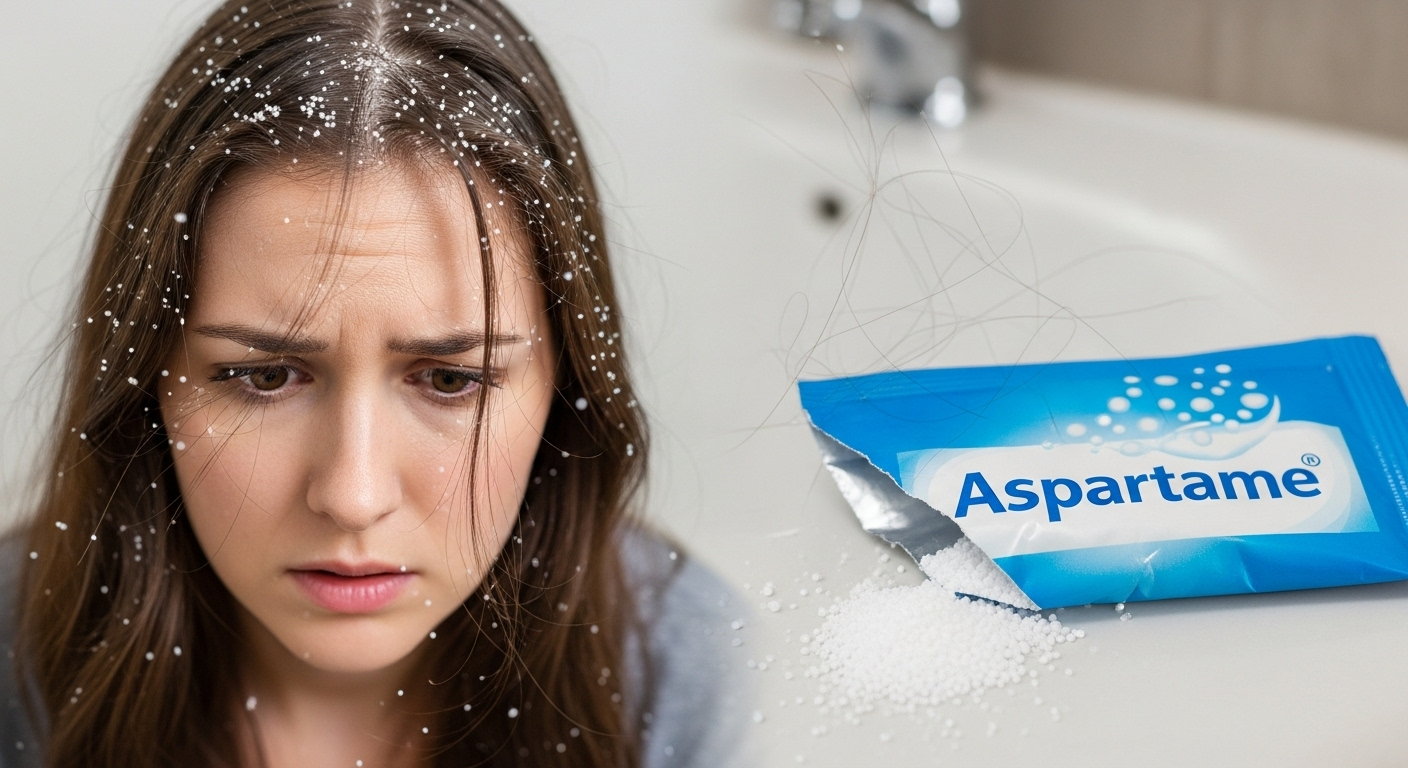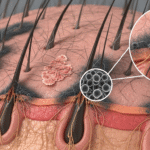Many individuals are concerned about (Aspartame Hair Loss), the potential effects of artificial sweeteners on their health. One common worry that has surfaced is whether aspartame, a widely used sugar substitute, could contribute to hair loss. In this article, we will explore the connection between aspartame and hair loss, present scientific findings, and offer expert …
Many individuals are concerned about (Aspartame Hair Loss), the potential effects of artificial sweeteners on their health. One common worry that has surfaced is whether aspartame, a widely used sugar substitute, could contribute to hair loss.
In this article, we will explore the connection between aspartame and hair loss, present scientific findings, and offer expert insights to help you understand if this sweetener might be affecting your hair health.
By the end of this post, you’ll be equipped with the knowledge to make informed decisions about your diet and hair care.

What Is Aspartame and Can It Lead to Hair Loss?
What Is Aspartame?
Aspartame is a low-calorie artificial sweetener commonly found in a variety of foods and beverages, including diet sodas, sugar-free gum, and processed snacks. Chemically, it consists of two amino acids, aspartic acid and phenylalanine.
These components break down into harmless substances in the body, providing sweetness without adding significant calories.
Can Aspartame Cause Hair Loss? The Controversy Explained
Despite being generally recognized as safe by health authorities, aspartame has raised concerns among some individuals who believe it may cause hair loss. While there is no definitive scientific evidence linking aspartame directly to hair loss, reports from some users suggest that aspartame may contribute to thinning hair in certain individuals.
These reports remain anecdotal, and further research is needed to establish a clear connection.
How Aspartame Hair Loss Might Happen: Exploring the Science

Theories Behind Aspartame Hair Loss
Some theories suggest that aspartame could affect hair follicles and lead to hair loss. One hypothesis is that aspartame might disrupt hormonal balance in the body, leading to conditions like hair thinning or alopecia.
Another theory is that aspartame could contribute to oxidative stress, which is known to damage hair follicles and prevent them from growing new hair.
Aspartame Hair Loss: Other Contributing Factors
While the potential link between aspartame and hair loss is still under investigation, other factors should not be overlooked. Hair loss can be caused by various reasons, including:
- Genetics: Male and female pattern baldness, the most common form of hair loss, is often hereditary.
- Poor Diet: Deficiencies in key nutrients, such as vitamins and minerals, can lead to hair thinning.
- Stress: Emotional and physical stress are known to contribute to telogen effluvium, a form of temporary hair loss.
- Underlying Medical Conditions: Hormonal imbalances or autoimmune diseases can lead to hair thinning or loss.
Expert Insights on Aspartame Hair Loss
Case Studies – Aspartame Hair Loss
Some individuals claim to have experienced hair thinning after regularly consuming products containing aspartame. While these cases are anecdotal and not scientifically verified, it’s important to listen to your body and make dietary changes if you suspect aspartame could be affecting your hair.
Professional Advice on Aspartame Hair Loss Prevention
If you’re worried about the potential link between aspartame and hair loss, experts recommend:
- Limiting Aspartame Consumption: Consider reducing or eliminating aspartame from your diet to see if it improves your hair condition.
- Maintaining a Healthy Diet: Ensure you’re getting enough vitamins and minerals, especially those critical for hair health, like biotin, iron, and vitamin D.
- Managing Stress: Implement stress-reducing techniques such as yoga, meditation, or regular physical exercise.
Recovery Tips and Solutions for Aspartame Hair Loss

Building a Healthy Diet to Promote Hair Health
A well-rounded diet is essential for hair growth. Make sure your meals are rich in nutrients that support hair health, such as:
- Protein-rich foods: Chicken, fish, eggs, and beans help promote keratin production.
- Vitamins and minerals: Vitamin A, B-complex vitamins, and zinc are crucial for strong, healthy hair.
- Iron-rich foods: Spinach, red meat, and legumes provide the iron necessary to prevent hair thinning.
Best Hair Care Products to Strengthen Hair
Look for hair care products containing active ingredients like biotin, keratin, and saw palmetto. These can help nourish the hair and prevent further breakage or thinning.
Stress Management for Hair Health
Since stress is a known contributor to hair loss, it’s important to manage it effectively. Practices like mindfulness meditation, regular exercise, and relaxation techniques can help reduce stress levels and improve overall hair health.
FAQs
Can Aspartame Be Completely Eliminated From the Diet to Prevent Hair Loss?
Yes, eliminating aspartame from your diet is an option if you’re concerned about potential effects on your health, including hair loss. By opting for natural sweeteners like stevia or monk fruit, you can reduce your intake of artificial additives.
What Treatments Are Available for Aspartame-Induced Hair Loss?
If you believe aspartame is contributing to your hair loss, the first step is to remove it from your diet. Additionally, you can consider using topical treatments like minoxidil, which is FDA-approved for promoting hair regrowth, or taking supplements designed to support hair health.
How Long After Stopping Aspartame Can Hair Growth Return?
Hair regrowth depends on various factors, including the severity of hair loss and individual recovery. After eliminating aspartame, some individuals may notice improvements in hair growth within a few months, while others may take longer.
Conclusion
The debate over whether aspartame causes hair loss is ongoing, with no definitive evidence proving a direct link. While some individuals may experience hair thinning due to aspartame, it’s essential to consider other possible factors, such as genetics, diet, and stress.
If you suspect that aspartame is affecting your hair, consider eliminating it from your diet and adopting healthier lifestyle choices to support hair growth.
If you’re concerned about hair loss and want personalized advice, book a consultation with Dr. Uzma Irfan, an ISHRS-certified surgeon in Islamabad today. Get a tailored treatment plan and ensure a smooth recovery for your hair health.






